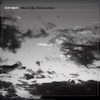 Over their career, Corrupted have been taking a slow (naturally) shift away from their initial starting point: the sludgy assault of the early releases has been replaced with something more akin to modern composition or ambient music. As such, Garten der Unbewusstheit is a logical progression for them as it combines the extreme heaviness of their old recordings with an almost gossamer thin presence. I have always associated their work with the darkness and the atrocities that appear on their album covers and on this album they distil all that hate in one clean swoop into a powerful, positive gesture without losing one shred of their music's emotional effect.
Over their career, Corrupted have been taking a slow (naturally) shift away from their initial starting point: the sludgy assault of the early releases has been replaced with something more akin to modern composition or ambient music. As such, Garten der Unbewusstheit is a logical progression for them as it combines the extreme heaviness of their old recordings with an almost gossamer thin presence. I have always associated their work with the darkness and the atrocities that appear on their album covers and on this album they distil all that hate in one clean swoop into a powerful, positive gesture without losing one shred of their music's emotional effect.
 
The three pieces that make up Garten der Unbewusstheit are less individual pieces than they are movements in what is nearly a symphony. "Garten" builds up from an almost silence as a stark guitar line slowly develops the motif around which the album is centred. The music sounds like Earth’s Hex album if it was re-arranged by Henryk Górecki. There is a sorrow, a melancholy that runs through this piece and indeed the entire album. However, unlike the bleakness of Corrupted’s older works, there is a feeling of hope running through each section. This hopefulness becomes almost a physical entity as the heavy guitars kick in; it feels like the group have scooped me up and delivered me to a god.
Like the aforementioned Earth album, Garten der Unbewusstheit is not just based on an interplay of quiet/loud dynamics. Corrupted use timing in a way that secures the listener in front of the speakers like a set of manacles. Notes are left to hang for what feels like an eternity before the next wave of sound knocks the disturbed air back down. Relying on timing and expression, the music is forceful even when the group’s focus is upon the delicate sound of a classical guitar as evidenced on the instrumental "Against the Dark Days," which bridges the two major pieces of the album.
The performance of a group as a whole is never less than intense and impressively, as epic and evocative as the music gets, Hevi’s vocals manage to chart the same depths and channel the same power as the other elements of the work. Sadly this was his last recording with the group before he left music earlier this year to dedicate his life to cosplay. Whether Corrupted do as well with his replacement, Taiki, remains to be seen but as a swansong for Hevi, it would be hard to beat this.
On the album’s closer, "Gekkou no Daichi," the band come together for one last, long push towards infinity. Slowly, they return to the same clusters of notes that opened the album before igniting the fuse and lifting off into the stratosphere. At its peak, the piece explodes into a cathartic, uplifting and decimating inferno. While I know a lot of people seem to prefer the old Corrupted to their current (or at least most recent) incarnation, I do not know how based on the sheer vastness and passion of pieces and indeed albums like this. The final minutes take all the pessimism, dejection and moral extremity that they have explored in their career and convert it all into one final hopeful thrust for a blissful enlightenment; a state of nirvana or satori.
I have listened to Garten der Unbewusstheit at least a dozen times in the last few weeks and it seems to only increase in its influence. This is an astounding album beyond any simple notion of "Is it good?" or "Is it heavy?" No, it is an emotionally cleansing experience.
samples:
 
Read More

